
Malayalam, the lingua franca of the Indian state of Kerala and the union territories of Lakshadweep and Puduchery, is one of the six classical languages of India. Malayalam literature comprises those literary texts written in Malayalam, a South-Dravidian language spoken in the Indian state of Kerala. The first travelogue in any Indian language is the Malayalam Varthamanappusthakam, written by Paremmakkal Thoma Kathanar in 1785. Malayalam literature has been presented with 6 Jnanapith awards, the second-most for any Dravidian language and the third-highest for any Indian language.

N. S. Madhavan is an Indian writer of Malayalam literature. Known for his novel, Lanthan Batheriyile Luthiniyakal and a host of short stories such as Higuita, Thiruthu, Chulaimedile Shavangal and Vanmarangal Veezhumpol, Madhavan also writes football columns and travel articles. He is a distinguished fellow of Kerala Sahitya Akademi and a recipient of several major awards including Odakkuzhal Award, Kerala Sahitya Akademi Award for Story, Kerala Sahitya Akademi Award for Novel, Muttathu Varkey Award, Mathrubhumi Literary Award, Crossword Book Award and Kerala State Students Federation Sahithyolsav Award.
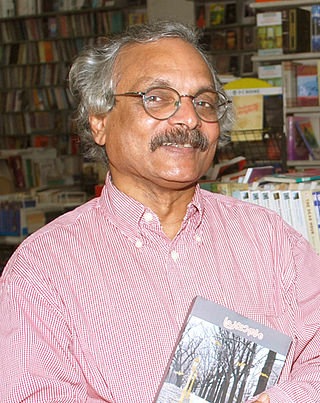
Maniyambath Mukundan is an Indian author of Malayalam literature and former diplomat. He worked as a cultural attaché at the Embassy of France in Delhi from 1961 to 2004, while concurrently working as an author. Many of his early works are set in Mahe (Mayyazhi), his homeland, which earned him the moniker Mayyazhiyude Kathakaaran. He is known to be one of the pioneers of modernity in Malayalam literature. Some of his best known works include Mayyazhippuzhayude Theerangalil, Daivathinte Vikrithikal, Kesavante Vilapangal, and Pravasam.

P. Sachidanandan, who uses the pseudonym Anand, is an Indian writer, writing primarily in Malayalam. He is one of the known living intellectuals in India. His works are noted for their philosophical flavor, historical context and their humanism. He is a recipient of the Sahitya Akademi Award and three Kerala Sahitya Akademi Awards. He is also a recipient of Ezhuthachan Puraskaram, Vayalar Award, Odakkuzhal Award, Muttathu Varkey Award, Vallathol Award and Yashpal Award. He did not accept the Yashpal Award and the Kerala Sahitya Akademi Award for Novel.
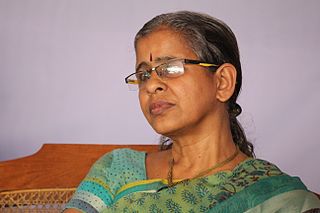
V. M. Girija is an Indian poet and essayist, writing in Malayalam language. She has published a number of books, which include Prem - Ek Album, the Hindi translation of her poetry anthology in Malayalam, Pranayam Oralbum. Kerala Sahithya Akademi awarded her their 2018 annual award for poetry and she is a recipient of 'Changmpuzha Award for literature' and the 'Basheer Amma Malayalam Puraskaram'.

Ottaplakkal Neelakandan Velu Kurup was a Malayalam poet and lyricist from Kerala, India, who won the Jnanpith Award, the highest literary award in India for the year 2007. He received the awards Padma Shri in 1998 and Padma Vibhushan in 2011, the fourth and second highest civilian honours from the Government of India. In 2007 he was awarded an Honorary Doctorate by University of Kerala, Trivandrum. O. N. V. was known for his leftist leaning. He was a leader of All India Students Federation (AISF). He died on 13 February 2016 at KIMS hospital in Thiruvananthapuram due to age-related illnesses, aged 84.

Kamala Surayya , popularly known by her one-time pen name Madhavikutty and married name Kamala Das, was an Indian poet in English as well as an author in Malayalam from Kerala, India. Her fame in Kerala primarily stems from her short stories and autobiography, My Story, whereas her body of work in English, penned under the pseudonym Kamala Das, is renowned for its poems and candid autobiography. She was also a widely read columnist and wrote on diverse topics including women's issues, child care, politics, etc. Her liberal treatment of female sexuality, marked her as an iconoclast in popular culture of her generation. On 31 May 2009, aged 75, she died at Jehangir Hospital in Pune.
Muttathu Varkey was an Indian novelist, short story writer, and poet of Malayalam. He was best known for a genre of sentiment-filled romantic fiction known as painkili (janapriya) novel in Malayalam literature, named after his famous novel Paadatha Painkili.

Ranjith Sankar is an Indian filmmaker who works in Malayalam films. He started his movie career with the 2009 thriller Passenger. He launched his production house Dreams N Beyond in 2012 and his distribution house Punyalan Cinemas in 2017.

K. R. Meera is an Indian author and journalist, who writes in Malayalam. She was born in Sasthamkotta, Kollam district in Kerala. She worked as a journalist in Malayala Manorama but later resigned to concentrate more on writing. She started writing fiction in 2001 and her first short story collection Ormayude Njarambu was published in 2002. Since then she has published five collections of short stories, two novellas, five novels and two children's books. She won the Kerala Sahitya Akademi Award in 2009 for her short-story, Ave Maria. Her novel Aarachaar (2012) is widely regarded as one of the best literary works produced in Malayalam language. It received several awards including the Kerala Sahitya Akademi Award (2013), Odakkuzhal Award (2013), Vayalar Award (2014) and Kendra Sahitya Akademi Award (2015). It was also shortlisted for the 2016 DSC Prize for South Asian Literature.
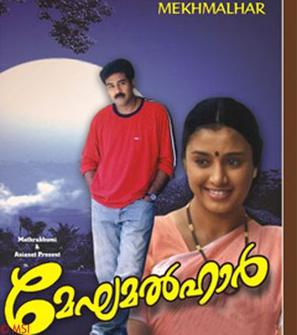
Meghamalhar is a 2001 Indian Malayalam-language romance film written and directed by Kamal from a story by Iqbal Kuttippuram. It stars Biju Menon and Samyuktha Varma in the lead roles while Poornima Mohan, Sreenath, Shivaji, Siddique, and Raghavan play supporting roles. The film was jointly produced by M. V. Shreyams Kumar for Mathrubhumi and Asianet. It won two Kerala State Film Awards and two Filmfare Awards South. The movie was reported to be inspired by the 1945 British movie Brief Encounter.

Benny Daniel, better known by his pen name Benyamin, is an Indian writer in Malayalam from Kerala. He is the author of about thirty books in various genres – from short stories to novels and memoirs. For his novel Goat Days (Aadujeevitham), he won the Abu Dhabi Sakthi Award, Kerala Sahitya Akademi Award and JCB Prize, and was shortlisted for the Man Asian Literary Prize. The novel Manthalirile 20 Communist Varshangal won the Vayalar Award in 2021.
Chandrika Balan is an Indian writer who has published books in English and Malayalam, under the pen name Chandramathi, ചന്ദ്രമതി in Malayalam. She is a writer of fiction, a translator, and critic in English and Malayalam. Chandramathi has published four books in English and 20 in Malayalam, including 12 collections of short stories, an anthology of medieval Malayalam poetry, two collections of essays, two memoirs, and five books translated from English. The Malayalam film Njandukalude Nattil Oridavela was based on her book.

Thatteem Mutteem was a Malayalam-language sitcom that has broadcast on Mazhavil Manorama from 1 July 2012. It was one of Malayalam television's oldest and longest-running series, having premiered at the channel's launch. The show stars veteran actors K.P.A.C Lalitha, Manju Pillai, Jayakumar Parameswaran Pillai, Naseer Sankranthi, Bhagyalakshmi Prabhu, Sidharth Prabhu, Rajesh Paravoor, Shalu Kurian, Shara Sherly Samuel Koshy, Parvathy Lal and Anoop Vincent in lead roles. It has been critically acclaimed, winning the Kerala State Television Award for the Best Comedy Show in both 2014 and 2016.
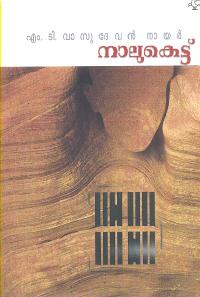
Naalukettu is a Malayalam novel written by M. T. Vasudevan Nair. Published in 1958, it was MT's first major novel. The title attributes to Nālukettu, a traditional ancestral home (Taravad) of a Nair joint family. Like many other novels written by MT, Naalukettu is also set against the backdrop of the crumbling matrilineal order of Kerala in a newly independent India.
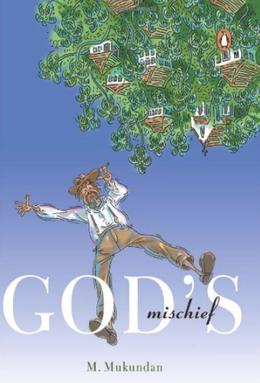
God's Mischief is a 1989 Malayalam novel written by M. Mukundan. Like most of Mukundan's works, this novel too is based in Mayyazhi, better known once as Mahé, the French colony after it was decolonised. The story centres on a magician, Father Alfonso, his daughter, Elsee and an Ayurveda Vaidyar Kumaran and his two twin sons and how their life changes after the land is decolonised. The novel won the Kendra Sahitya Akademi Award and the N. V. Prize. It was adapted into a film by noted director Lenin Rajendran in 1992.

Kesavan's Lamentations is a 1999 Malayalam novel written by M. Mukundan. The novel tells the story of a writer Kesavan who writes a novel on a child named Appukkuttan who grows under the influence of E. M. S. Namboodiripad.
The Malayalam novel is an important part of Malayalam literature. This article focuses on novels, written in Malayalam language, a Dravidian language spoken predominantly in the Indian state of Kerala and the Lakshadweep islands.
JCB Prize for Literature is an Indian literary award established in 2018. It is awarded annually with ₹2,500,000 (US$30,000) prize to a distinguished work of fiction by an Indian writer working in English or translated fiction by an Indian writer. The winners will be announced each November with shortlists in October and longlists in September. It has been called "India's most valuable literature prize". Rana Dasgupta is the founding Literary Director of the JCB Prize. In 2020, Mita Kapur was appointed as the new Literary Director.















